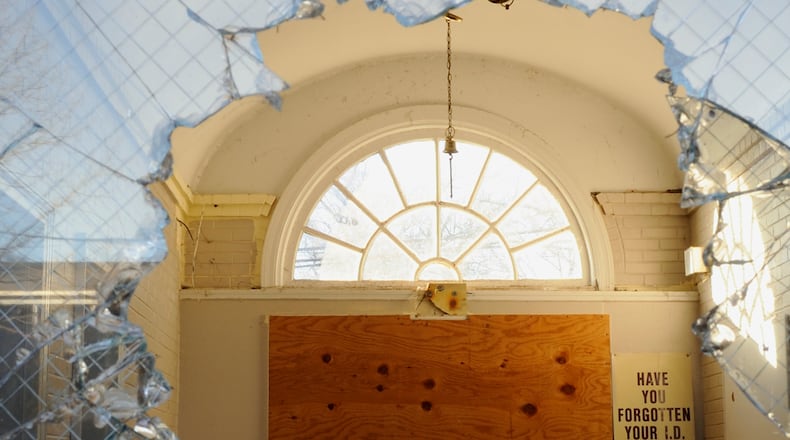BY FELICIA FEASTER
For the AJC
Credit: Liz Miniet
Credit: Liz Miniet
Photographer Andrew Feiler spent over a year capturing the desolate campus of Atlanta's Morris Brown College. In his images of vacant classrooms and cafeterias, alumni houses and empty chapels, he documents the sad decline of this college founded in 1881 by African-Americans and dedicated to educating children of limited means. The college was mired in scandal and struggled to stay open after misappropriation of federal funds and then lost its accreditation in 2002.
The exhibition takes its title from an inscription on the bell that hangs at Morris Brown College “dedicated to the education of youth.” There is a deeply melancholy edge to this show, a feeling of the enormous potential the school represented, and how that promise has eroded in the peeling paint, fire-singed rooms and squalor of halls of learning turned to homeless encampments.
An accompanying book features essays to go with Feiler’s photographs, detailing the close-knit students and faculty and the sense of pride and solidarity the school fostered. As Feiler acknowledges in his own essay, Morris Brown’s situation is representative of the increasing challenges to the middle class in 2015 America, where many paths to upward mobility have toppled. “Without Regard” manages to be both precisely concerned with one school’s fate, while also reflecting on larger social issues.
Credit: Liz Miniet
Credit: Liz Miniet
In many ways, Feiler’s images of abandoned classrooms and locker rooms can feel like a larger statement about the American commitment to education and about our national priorities as college becomes increasingly unaffordable and the middle class seems to be shrinking rather than booming. The images also speak to history and mortality, and the passage of time evident in the fading, molting photographs of former Morris Brown students still clinging to walls and bulletin boards in the school hallways and offices.
The images themselves are a disquieting contrast of hope and hopelessness. Feiler photographs wooden desks, with their drawers wrested open and paint peeling from the wall behind and classrooms filled with toppled desks and floors sprinkled with a dusting of plaster and insulation as ceilings crumble. Feiler frames several of his rooms through broken windows, showing lovely stained glass imprinted with prayers now ravaged. In “Fire Damage — Alumni Hall,” a once stately room with built-in bookcases and an elegant fireplace is littered with trash, its walls and ceiling stained with soot.
Credit: Liz Miniet
Credit: Liz Miniet
Many of the rooms Feiler photographs have the eerie quality of spaces recently abandoned, exhibiting a disconcerting feeling that human beings have only recently fled. In “School Desk Array I,” chairs are still arranged in neat rows and linoleum floors gleam with the hint of a recent mopping, giving the impression of a world preserved in amber.
The spaces Feiler documents feel haunted in the way that rooms that had been buzzing with life and activity do once the people are gone. There are unsettling reminders of people present in the images: the students who once occupied these desks and swam in these now-empty swimming pools. And they are also inferred in the crumbled bags of Fritos and water bottles that litter these vacant rooms, representing the homeless who now camp out in these abandoned buildings. There are different people passing through Morris Brown now, as corridors of upward mobility now seem more about sad decline.
ART REVIEW
“Without Regard to Sex, Race, or Color: The Past, Present, and Future of One Historically Black College”
Through Nov. 29. 8 a.m.-midnight Mondays-Thursdays; 8 a.m.-6 p.m. Fridays; noon-6 p.m. Saturdays; noon-midnight Sundays. Free. Atlanta University Center Robert W. Woodruff Library and Galleries, 111 James P. Brawley Drive S.W., Atlanta. 404-978-2000, www.auctr.edu.
Bottom line: Affecting images of dashed dreams in photographs of Morris Brown College.
About the Author
The Latest
Featured






